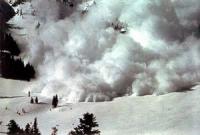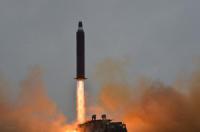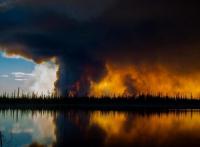-
How disaster relief efforts could be improved with game theory
The number of disasters has doubled globally since the 1980s, with the damage and losses estimated at an average $100 billion a year since the new millennium, and the number of people affected also growing. Hurricane Katrina in 2005 was the costliest natural disaster in the U.S., with estimates between $100 billion and $125 billion. The death toll of Katrina is still being debated, but we know that at least 2,000 were killed, and thousands were left homeless. Worldwide, the toll is staggering. The challenges to disaster relief organizations, including nongovernmental organizations (NGOs), are immense, and the competition among them is intense. My team and I have been looking at a novel way to improve how we respond to natural disasters. One solution might be game theory.
-
-
The WikiLeaks CIA release: When will we learn?

This week’s WikiLeaks release of what is apparently a trove of Central Intelligence Agency information related to its computer hacking should surprise no one: Despite its complaints of being targeted by cyberattackers from other countries, the U.S. does a fair amount of its own hacking. Multiple federal agencies are involved, including the CIA and the National Security Agency, and even friendly nations. These latest disclosures also remind us of the cybersecurity truism that any electronic device connected to a network can be hacked. If the United States is going to be successful at securing its crucial government information, it must do a better job managing the volume of information generated and controlling access to it, both authorized and otherwise. Granted, neither is an easy task. However, absent fundamental changes that fix the proverbial cult of classification, there likely will be many more WikiLeaks-type disclosures in the future.
-
-
The loaded history of self-defense

After the killing of 17-year-old Trayvon Martin in 2012, Harvard historian Caroline Light felt compelled to explore the roots of the American right to self-defense, which has helped turned the United States into a country with more guns than people. In her new book, Stand Your Ground: A History of America’s Love Affair with Lethal Self-Defense, Light traces the development of the notion of self-defense from English common law to contemporary stand-your-ground gun laws.
-
-
New avalanche, snow burial practice guidelines

With the growing popularity of backcountry snow activities, it is increasingly important to understand the best techniques for avalanche rescue. Each year, there are over 150 avalanche fatalities in the US and Europe, with most deaths occurring among recreational groups that include skiers, snowboarders, snowmobilers, and mountaineers. The Wilderness Medical Society has issued new practice guidelines to help medical professionals, as well as the public, understand the latest techniques and recommendations for avalanche risk management and rescue protocols.
-
-
White supremacists dramatically increase recruitment efforts on U.S. college campuses

White supremacists, emboldened by the 2016 elections and the current political climate, are currently engaged in an unprecedented outreach effort to attract and recruit students on American college campuses. The Anti-Defamation League (ADL) has cataloged 107 incidents of white supremacist fliering on college campuses since the school year began in September 2016, with surge of activity since January 2017, when 63 of the total incidents (61 percent) occurred.
-
-
Missiles tested by North Korean this weekend capable of carrying 500 kg warhead to 1,000 km

Over the weekend, North Korea launched four ballistic missiles into the Sea of Japan. The missiles reportedly traveled an average of 1,000 km (620 miles), and landed within 300 to 350 km (185 to 220 miles) of Japan. The four launches were said to be “simultaneous,” leading to speculation they were intended to be a barrage attack to overwhelm a missile defense system. The missiles appear to be Extended-Range Scud (“Scud ER”) missiles, which are modifications of short-range Scud missiles, lengthened to carry additional fuel and lightened by making the body out of aluminum rather than the usual steel. Analysis suggests the missile could carry a warhead of roughly 500 kg to 1,000 km.
-
-
Preventing nuclear waste seepage
Nuclear waste is a reality, whether remnants of nuclear weapons or the byproducts of nuclear power plants. While we aren’t at risk of an attack from a giant radioactive lizard, nuclear waste can still pose threats to human health. The best way to safely store and contain nuclear waste is by mixing it into a cement grout and storing it in large concrete vaults. Researchers are testing the permeability of these grout mixtures and in turn, the ability for nuclear materials to eventually flow through the solidified grout and into the environment.
-
-
Aging affects the performance of automatic facial recognition systems

Images of our faces exist in numerous important databases – driver’s license, passport, law enforcement, employment – all to accurately identify us. But can these images continue to identify us as we age? Biometrics experts set out to investigate what extent facial aging affects the performance of automatic facial recognition systems and what implications it could have on successfully identifying criminals or determining when identification documents need to be renewed.
-
-
Better communication key to reducing earthquake death toll

A major problem in conveying earthquake risks to the public is that scientists are unable to predict when, where, and with what strength the next earthquake will strike. Instead, they use probabilistic forecasting based on seismic clustering. Earthquake experts have long grappled with the problem of how to convey these complex probabilities to lay persons.
-
-
Sandia Labs taking a modern approach to evaluating nuclear weapons
Components of nuclear weapons age, and scientists and engineers address that through life extension programs or less comprehensive alterations. The United States last conducted underground nuclear testing in 1992 and has been in a moratorium ever since. Since then, Sandia Lab has used non-nuclear tests, experiments and computer simulations to study environments weapons might face, such as vibration, radiation or extreme cold or heat.
-
-
Humans have dramatically increased extent, duration of U.S. wildfire season

The United States has experienced some of its largest wildfires on record over the past decade, especially in the western half of the country. The duration and intensity of future wildfire seasons is a point of national concern given the potentially severe impact on agriculture, ecosystems, recreation, and other economic sectors, as well as the high cost of extinguishing blazes. The annual cost of fighting wildfires in the United States has exceeded $2 billion in recent years. Humans have dramatically increased the spatial and seasonal extent of wildfires across the United States in recent decades and ignited more than 840,000 blazes in the spring, fall and winter seasons over a 21-year period, according to a new study.
-
-
Experts: Iran advancing nuclear program with help of North Korea
Iran is using its strategic ties to North Korea to advance its illicit nuclear weapons program, experts say. Nuclear and ballistic missile ties between the two nations are longstanding and ongoing, though unlike Iran, North Korea already has developed nuclear weapons. While Iran is temporarily constrained by the nuclear deal, it can contribute to the development of North Korea’s program by sharing its technology and through finance.
-
-
More black police will not result in fewer police-involved homicides of black citizens
Hiring more black police officers is not a viable strategy for reducing police-involved homicides of black citizens in most cities, according to new research. The study finds that, for many cities, it would take a massive increase in the percentage of black police officers to reduce the number of police-involved shootings of black citizens. Adding just a few black officers, the researchers say, won’t help and might make matters worse.
-
-
Threats of violent Islamist and far-right extremism: What does the research say?
The 9/11 attacks were perpetrated by Islamist extremists, resulting in nearly 18 times more deaths than America’s second most devastating terrorist attack – the Oklahoma City bombing. More than any other terrorist event in U.S. history, 9/11 drives Americans’ perspectives on who and what ideologies are associated with violent extremism. But focusing solely on Islamist extremism when investigating, researching and developing counterterrorism policies goes against what the numbers tell us. Far-right extremism also poses a significant threat to the lives and well-being of Americans. This risk is often ignored or underestimated because of the devastating impact of the 9/11 terrorist attacks.It remains imperative to support policies, programs, and research aimed at countering all forms of violent extremism.
-
-
Assault weapons not protected by Second Amendment: U.S. appeals court

The U.S. Court of Appeals for the Fourth circuit ruled 10-4 to uphold Maryland’s ban on assault weapons, ruling that assault weapons are not protected under the Second Amendment of the U.S. Constitution. “Put simply, we have no power to extend Second Amendment protection to the weapons of war,” Judge Robert King wrote. “Both before and after Newtown, similar military-style rifles and detachable magazines have been used to perpetrate mass shootings in places whose names have become synonymous with the slaughters that occurred there,” he wrote.
-
More headlines
The long view
Factories First: Winning the Drone War Before It Starts
Wars are won by factories before they are won on the battlefield,Martin C. Feldmann writes, noting that the United States lacks the manufacturing depth for the coming drone age. Rectifying this situation “will take far more than procurement tweaks,” Feldmann writes. “It demands a national-level, wartime-scale industrial mobilization.”
How Male Grievance Fuels Radicalization and Extremist Violence
Social extremism is evolving in reach and form. While traditional racial supremacy ideologies remain, contemporary movements are now often fueled by something more personal and emotionally resonant: male grievance.
The Surprising Reasons Floods and Other Disasters Are Deadlier at Night
It’s not just that it’s dark and people are asleep. Urban sprawl, confirmation bias, and other factors can play a role.
Why Flash Flood Warnings Will Continue to Go Unheeded
Experts say local education and community support are key to conveying risk.
